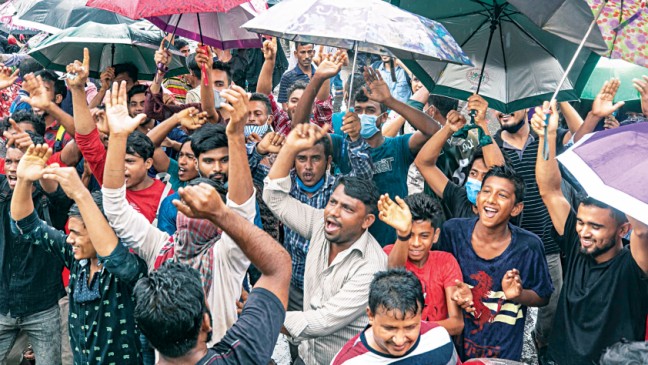Thousands of garment workers are going through immense sufferings and slapped with higher expenses as public transport has come to a halt because of the countrywide lockdown.
The movement of all forms of public transport, except rickshaws, was banned for three days from Monday as the government went into a limited lockdown to tame the raging coronavirus.
But garment factories in the port city were open. However, most of the owners did not arrange transport facilities for the workers although they were supposed to do so. Workers alleged that owners did not provide any vehicles for them, although transport support was available for officers and management staff.
Hundreds of office-goers, including garment workers, waited at the Tigerpass road for as long as four hours to find a vehicle to go to their offices and factories, mainly in the Chattogram Economic Processing Zone (CEPZ).
A similar situation was seen at the bus stand in Muradpur, Bahaddarhat, New Bridge area, GEC Intersection, Lalkhan Bazar, and Agrabad area.
"It is a hilarious decision to stop public transport while keeping factories open. The workers are suffering. Either factories should be closed, or the public transport should be open," said Amena Khatun, a garment factory worker.
She waited from 6:00 am to 10:00 am and found no transport. "I don't know when I will be able to go to the factory," she added.
Mohammad Arifuzzaman, a worker of Youth Jeans Ltd, said he had been going to the factory by rickshaws for the last two days. It cost him Tk 400-500 a day.
"Our salary is low. It is not possible to go to the factory by rickshaws every day."
Finding no vehicles, angry workers blocked roads for an hour from 9:00 at the Tigerpass, demanding the resumption of the public transport service.
The situation returned to normalcy after the police managed buses and sent them to their workplaces.
Nezam Uddin, officer-in-charge of Kotwali Police Station, said, "Workers blocked the roads as there was no public transport. Later, we arranged a bus for them."
Rezaul Islam, a director of Youth Jeans Ltd, said the company's two factories in the CEPZ employed about 2,000. Most of them lived within walking distance.
The workers who reside in distant places had to take buses and come to the factories on their own. Now bus drivers did not want to operate as they faced harassment by the administration on the road, he said.
"Vehicles will be provided for the workers as soon as possible."
Yesterday, the Bangladesh Garment Manufacturers and Exporters Association (BGMEA) sat with owners to discuss how to keep factories running in compliance with health protocols and arrange vehicles for the workers, said MA Salam, a director of the association.
"I hope it will be resolved very soon."
He said about 60 per cent of the workers lived within walking distance of the factories, and they preferred to walking to factories instead of riding a bus.
Most factories have their own transport system, but it might not be possible for them to ensure the facility for 100 per cent of the workers, he said.
"Initiatives are being taken to provide transportation to those who live far away from the factories," said the former vice-president of the BGMEA.
As there were fewer rickshaws on the roads, pullers were charging more than three times the regular fare, several executives and workers said.
Most of the officials and executives had to reach their offices on rickshaws and ride-sharing bikes. But there were not enough rickshaws and bikes available, forcing some of them to walk to their offices and factories.
There are about 500 active garment factories in the port city, employing 5.5 lakh to 6 lakh workers, according to Salam.

